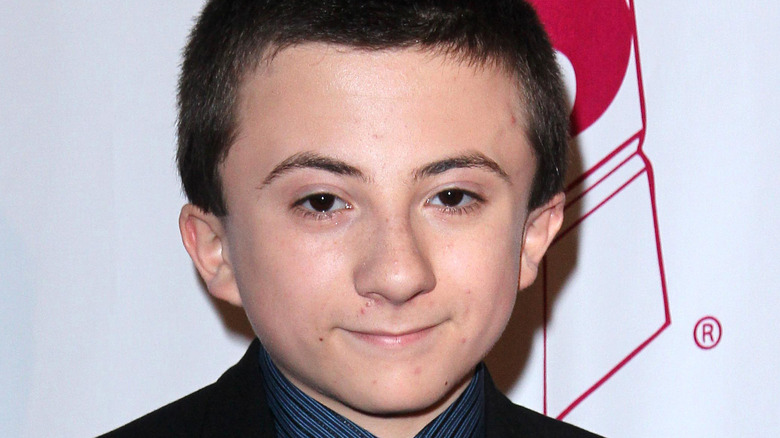Celebs With Extremely Rare Medical Conditions
Many celebs are opening up about living with medical conditions, thereby helping to attenuate societal stigma through their candid and heartfelt stories. For instance, Selena Gomez has discussed her Lupus diagnosis, while Meghan Markle has been profoundly honest about her ongoing issues with depression.
However, there are a number of extremely rare medical conditions that remain misunderstood and thus stigmatized to an extent. Accordingly, a major challenge faced by those with rare disorders is receiving an appropriate diagnosis, which can be an incredibly frustrating process.
The Genetic and Rare Diseases Information Center reports that "there may be as many as 7,000 rare diseases" in existence and "the total number of Americans living with a rare disease is estimated at between 25-30 million." Subsequently, there are a number of prominent individuals who have been diagnosed with extremely rare medical conditions. These celebrities live with conditions (both physical and mental) that are not widely known within the public sphere, but through open discussions about their experiences, the potential for greater public awareness is increased.
Billie Eilish has synesthesia
Flying high off the success of her sophomore album "Happier Than Ever," Billie Eilish has used her platform to raise awareness of synesthesia, a rare medical condition that causes people to "hear colors, feel sounds and taste shapes" according to Scientific American.
During an August 2021 appearance on "The Tonight Show" to promote her new album, the Grammy-winning artist discussed her synesthesia, telling host Jimmy Fallon that she perceives him as a "vertical brown rectangle." Interestingly, the condition runs in Eilish's family. "I don't know why it exists. But my brother has it. I have it. My dad has it. ... It's a thing in your brain where you associate random stuff to everything," she explained. "So for instance, every day of the week has a color, a number, a shape." She went on to add that the condition is central to her creative process: "It inspires a bunch of stuff. So, like, all of my videos for the most part have to do with synesthesia, all of my artwork— everything I do live."
To wit, Eilish unveiled the Billie Eilish Experience in 2019. The museum exhibit was designed to showcase "the sights, smells, and sensations" of her "When We All Fall Asleep, Where Do We Go?" album across "14 unique rooms," all curated by the singer herself. To celebrate the gallery opening, Eilish posted a slide show on Instagram, and described it as "a space in which [she] could really show [fans] the way [she] see things."
Atticus Shaffer has osteogenesis imperfecta
Best known for his role as precocious youngest child Brick Heck on ABC sitcom "The Middle," Atticus Shaffer lives with osteogenesis imperfecta. Also known as brittle bone disease, the National Organization for Rare Disorders classifies osteogenesis imperfecta as "a rare disease affecting the connective tissue and is characterized by extremely fragile bones that break or fracture easily."
As Shaffer told Parade, he wants to encourage people to embrace their differences: "But my message to people with or without a condition is the fact that you can still do anything you set your mind to. You just have to do it in a slightly different way than other people."
He elaborated on living with OI in a TV Guide interview, emphasizing that he does not want to be defined by it. "My condition is just a small part of me and it's the same as hair color, eye color, whatever," he said, adding, "That was what my mom instilled in me ever since I was a baby — 'Be yourself, you are exactly the way you're supposed to be. You just have something that makes you unique, different.'"
Katie Leclerc has Meniere's disease
The ABC Family drama "Switched at Birth" has been lauded as an exemplar of deaf representation, being "the first American television show to feature multiple deaf characters and deaf actors front and center, not relegating them to the sidelines or to procedural subplots," as written in The Daily Beast.
Like her "Switched at Birth" character, Katie Leclerc has Meniere's disease, an inner ear condition that affects approximately "0.2 percent of the U.S. population", as per the American Hearing Research Foundation. In an interview with Women's Health, Leclerc explained, "My ears are full probably 60 percent of the time, where you feel like you have to pop them. There's lots of pressure. Probably 60 percent of the time I get a severe head rush, like when you stand up too quickly."
As Leclerc suggests, Meniere's is closely associated with vertigo, which, according to a 2008 study in "The Lancet", is one of its main complications, along with "fluctuating sensorineural hearing loss." However, regardless of the potential severity of the disease, the actor has spoken of the importance of a sanguine outlook towards Meniere's. "I try to approach everything with positivity," she told Self, adding, "You live in the moment, day to day. My sister also has the disease, and it hasn't stopped her — she's an inspiration to me."
Gigi Hadid has Hashimoto's disease
After being body shamed by online trolls, model Gigi Hadid revealed that she has Hashimoto's disease, which is "defined by the dramatic loss of thyroid follicular cells" and "affects up to 2% of the general population," according to a 2005 study published in the Journal of Autoimmune Diseases.
"For those of you so determined to come up with why my body has changed over the years, you may not know that when I started at 17, I was not yet diagnosed with Hashimoto's disease," Hadid tweeted, adding, "Those of you who called me 'too big for the industry' were seeing inflammation and water retention due to that."
Opening up about the diagnosis to E!, Hadid said that the illness had instilled her with a fervent body positive outlook: "I've loved my body when I was just diagnosed and I loved [it] going through it and I love my body now... It's just about everyone accepting their body as it matures and knowing that it's not always going to look the same and you can love yourself in all different sizes."
Adam Pearson has neurofibromatosis type 1
British actor Adam Pearson is best known for his role alongside Scarlett Johansson in the 2013 sci-fi film "Under the Skin." Pearson has neurofibromatosis type 1, which causes anything from typically non-cancerous growths "on or under the skin," to issues with the eyes, "bone deformities," "learning disorders," and more, per the Mayo Clinic.
Speaking with The Guardian, Pearson emphasized the significance of representation, which contributed to his decision to pursue an acting career: "There's a lot of fear around the unknown. If I can try to be as normal as possible and show there's nothing to fear — either on film or day to day, going round the corner to go shopping for milk — then the more people see it in wider society, the less stigma there is."
"Under the Skin" has been upheld as an example of challenging traditional beauty standards. Johansson plays an alien in the film; as such, her character is not inculcated with the same beauty standards as the human world she intercepts. For instance, she does not perceive Pearson's character as any different to the other men she encounters. As Pearson notes in his Guardian interview, "One of the main reasons for taking the role was because it was so moving and honest. For me, the film is about what the world looks like without knowledge and without prejudice."
Pearson is also a passionate campaigner against hate crime, having presented the BBC documentary "The Ugly Face of Disability Hate Crime."
Marilu Henner has hyperthymesia
Only a small number of the population is known to have the extremely rare hyperthymesia, which causes people to recollect nearly every second of their lives, according to a 2013 study in The Oxford Handbook of Social Cognition. Marilu Henner, star of classic sitcom "Taxi," is one of a tiny minority of individuals to have the condition, which is also dubbed "Autobiographical Memory."
In a 2010 chat with "60 Minutes," Henner showcased the incredible manifestation of the condition in her experience, recalling some uncanny specifics about her shoes: "I wore them October the first time, I wore them October 18th, 2007." Referencing a different pair, she said, "These I wore on April the 21st (referring to 2009). So that was a Tuesday." Henner expanded on the novelty in an interview with ABC News, telling the outlet, "When somebody gives me a date or a year or something, I see all these little movie montages, basically on a time continuum, and I'm scrolling through them and flashing through them." She also revealed that the condition is beneficial to her acting career: "I learned how to embrace my memories and celebrate them and explore them without hesitation whatsoever."
Due to the extreme rarity of hyperthymesia, there is a lack of understanding regarding its mechanisms and thus the exact occurrence of the condition is unknown, but according to a January 2016 report from Jamaica Hospital Medical Center, "there are only 61 people worldwide who have been identified as having hyperthymesia."
Gaten Matarazzo has Cleidocranial Dysplasia
Cleidocranial Dysplasia (CCD) is an extremely rare disorder that occurs in "about one in 1 million people" according to John Hopkins Medicine, which describes the condition thusly: "The bones in people with CCD might be formed differently or might be more fragile than normal... Skull and collarbone abnormalities, along with dental abnormalities, are the main features of CCD."
"Stranger Things" star Gaten Matarazzo has the condition, which affects the formation of his teeth and bones. During a 2018 appearance on "The Doctors," Matarazzo opened up about having already had "two surgeries and four extractions [of extra teeth]." He also shared the stigma he faced when trying to secure acting roles: "It's one of the biggest reasons why I [hadn't] been getting roles, because of my lisp, and the teeth situation, and my height."
In 2020, he underwent another surgery to remove extra teeth. "The surgery was a complete success," he wrote on Instagram, adding, "Those who suffer from Cleidocranial Dysplasia usually have Supernumerary teeth, which are extra teeth that grow in the gums. I've had several surgeries to extract these teeth from within my gums and help expose the teeth that should have already grown in considering my age. In this surgery, the team of amazing medical professionals extracted 14 supernumerary teeth and exposed six of my adult teeth."
Emily V. Gordon has Still's Disease and common variable immune deficiency
At 27 years old, screenwriter Emily V. Gordon was diagnosed with the extremely rare Still's disease, defined by Mayo Clinic as a form of "inflammatory arthritis." Gordon's condition has since progressed to a similarly rare complication, common variable immune deficiency, which the National Organization for Rare Disorders classifies as "an immune system dysfunction."
The illness initially mystified doctors, who were unable to trace the root of "an infection in [Gordon's] lungs," wrote The Guardian in a joint interview with Gordon and her husband, actor Kumail Nanjiani. As a result, Gordon was kept "in a medically induced coma" for 12 days, and "after eliminating leukaemia and HIV, the doctors finally realised that Gordon had a rare condition called adult-onset Still's disease," the outlet reported. The diagnosis inspired Gordon and Nanjiani to write the 2017 film "The Big Sick," in which the latter stars.
In a 2018 interview with the Immune Deficiency Foundation, Gordon explained that her subsequent diagnosis of common variable immune deficiency highlighted the discrimination that many people with chronic illnesses face. "I felt isolated. No one understands this. ... No one wants to talk about how you're sick again," she said. "I'd lie about why I wasn't meeting up with my friends." However, she has since found solace and empowerment in the chronic illness community: "I've truly embraced it this past year. I've found support when I didn't really know I was looking for it. I've learned that I'm not alone."
Danny DeVito has multiple epiphyseal dysplasia (Fairbank's disease)
Danny DeVito was born with multiple epiphyseal dysplasia, also known as Fairbank's disease, which is an uncommon form of dwarfism affecting "1 in 10,000 to 1 in 20,000 people," per the Journal of the American Academy of Orthopaedic Surgeons.
As reported in the The Guardian, "being short only felt like a disadvantage as a teenager" for DeVito, who described his height to the outlet as "five foot nothing." But the actor was then able to champion his uniqueness to his advantage. DeVito's distinct characteristics distinguished him from his outwardly conventional peers, thereby enabling him to secure momentous acting roles.
"Because I wasn't so average. Early on, when I'd go in for a part, people would go, 'Oh'. [Interested stare.]," he told The Guardian, adding, "Later, when they rewind that meeting, it would be, 'We've seen 20 actors for the role of the servant in The Merry Wives of Windsor, but wait a minute, we've done this already with this guy, so let's try this Danny guy.' I got two Shakespeare parts like that."
As Los Angeles Magazine noted in a laid-back interview with DeVito, "Fairbank's disease might have prematurely stopped his vertical growth, but he blossomed in virtually every other way."
Ed Catmull has aphantasia
Pixar co-founder and former Disney president Ed Catmull has been honored for his innovations in the field of 3D animation. Unbeknownst to many, he lives with aphantasia, a highly abstruse condition that "describes when people can't conjure visualizations in their mind's eye," as expounded by Big Think.
A BBC profile noted the ostensible discordance between Catmull's computer graphics expertise and his aphantasia: "Ed revolutionised 3D graphics, and the method he developed for animating curved surfaces became the industry standard. He first realised his brain was different when trying to perform Tibetan meditation with a colleague... he was told to picture a sphere in front of him." However, he could not visualize the sphere and was subsequently diagnosed with aphantasia.
But Catmull says that aphantasia was neither an impediment to his creativity or his ability to achieve. "I think the main message is, 'OK folks you can't use it as an excuse, you can still do good work, regardless of your differences'," he told the BBC, adding, "People had conflated visualisation with creativity and imagination and one of the messages is, 'they're not the same thing'."
Francesca Jones has ectrodactyly ectodermal dysplasia syndrome
British tennis star Francesca Jones has a career high ranking of no. 167, as per the International Tennis Federation. BBC Sport reports that Jones was "born with three fingers and a thumb on each hand, three toes on her right foot and four toes on her left." This is due to a rare medical condition called ectrodactyly ectodermal dysplasia syndrome, which Frontiers in Pediatrics says affects "around 1 in 90,000 in population" and is thought "to be caused by mutation in TP63 gene." Other symptoms of the condition are "malformations" of the "hands and feet," as well as "cleft lip and/or palate."
For Jones, embracing her differences is vital. "The way I see it is that I am just playing the game with a different set of cards," she told BBC Sport. "But it doesn't mean those cards still can't win the game."
Having experienced prejudice as a child, Jones wants to encourage children with similar conditions to never give up on their dreams in spite of others' bigotry. "When someone does say to you at eight, nine years old that you can't do something... I just tried to take it on the chin and see how I could prove that person wrong," she recalled, continuing, "And also prove to myself that I could do what I wanted to, and encourage others to do so too, because I think there are so many children that are limited by what others say."
Floyd Mayweather Sr. had sarcoidosis
Sarcoidosis is a rare lung disease with "fewer than 200,000 cases per year in the United States," as reported by the American Lung Association. "The first stage of sarcoidosis is inflammation. The increased inflammation in your body may cause flu-like symptoms such as night sweats, joint pain and fatigue," elucidates the ALA. "The second stage of the disease occurs when granulomas, or masses of inflamed tissue, form in the body."
Former boxer Floyd Mayweather Sr., who is the father of undefeated boxing champion Floyd Mayweather Jr., opened up about his sarcoidosis diagnosis to Fight Hype, explaining, "This disease I got is serious man. It attacks every organ in your body and sometimes I have my good days and then other days are bad."
A general lack of awareness of rare illnesses is a major encumbrance to receiving the help that patients need. Subsequently, Mayweather Sr. added that, although sarcoidosis is uncommon and thus misunderstood, it needs to be taken seriously: "I know a lot of people still don't know about sarcoidosis, but it ain't nothing to play with." The ex-boxer has since claimed that he no longer has the disease.
Kim Basinger has agoraphobia
While panic attacks are fairly common, they can lead to agoraphobia, a rare but severe complication characterized by a fear of public spaces. A 2020 study published by Europe PMC states that "agoraphobia is present in approximately 1.7% of the general population."
In a 2001 installment of the America Undercover docuseries, titled "Panic: A Film About Coping," actor Kim Basinger discussed her agoraphobia, recounting a panic attack that led to her rushing out of a health food store, driving home, "and not leaving for six months."
Following her divorce from Alec Baldwin, Basinger's brother-in-law, Billy Baldwin, made some problematic statements to the New York Post in 2007. "One minute she could be very loving and caring and familiar... Then in the next breath, it all went bizarre... I don't know where agoraphobia begins and narcissism ends," he told the publication. His comments underscore the stigma associated with mental health disorders, particularly ones as rare as agoraphobia. Basinger's spokeswoman, Annette Wolf, refuted Baldwin's specific remarks about her client's condition, and added that Basinger had been treated for the disorder.
Six years later, Basinger opened up to Vanity Fair about her agoraphobia, revealing that she's found ways to carry on with the condition outside of medication. The outlet noted that Basinger even confronted her fears head-on by going "sky-diving with her teenage daughter." In her own words, Basinger said, "I wanted to face everything I was afraid of."
If you or someone you know is struggling with mental health, please contact the Crisis Text Line by texting HOME to 741741, call the National Alliance on Mental Illness helpline at 1-800-950-NAMI (6264), or visit the National Institute of Mental Health website.
Robin Roberts had myelodysplastic syndrome
Myelodysplastic syndrome is a rare blood disorder that affects just 20,000 Americans a year, as stated by the National Organization for Rare Disorders. The MDS Foundation explains, "Myelodysplastic Syndromes (MDS) are a group of diverse bone marrow disorders in which the bone marrow does not produce enough healthy blood cells."
"Good Morning America" anchor Robin Roberts developed myelodysplastic syndrome after recovering from breast cancer. In a deeply personal account published by ABC News, Roberts assured, "Sometimes the treatment for cancer can cause other serious medical problems. Today, I want to let you know that I've been diagnosed with MDS or myelodysplastic syndrome... My doctors tell me I'm going to beat this — and I know it's true."
Roberts was right: she did indeed recover from the condition. In 2017, she celebrated 5 years since her MDS recovery, having "received [a bone marrow] transplant after undergoing 10 days of extensive chemotherapy", as per ABC News. "It's considered to be a rebirth," Roberts enthused. "And I definitely felt that I was getting another chance at life."















